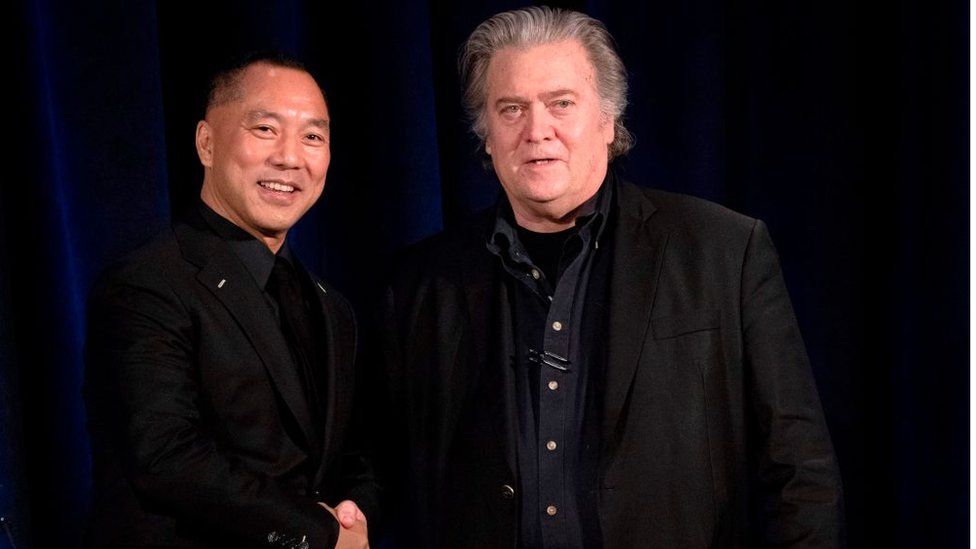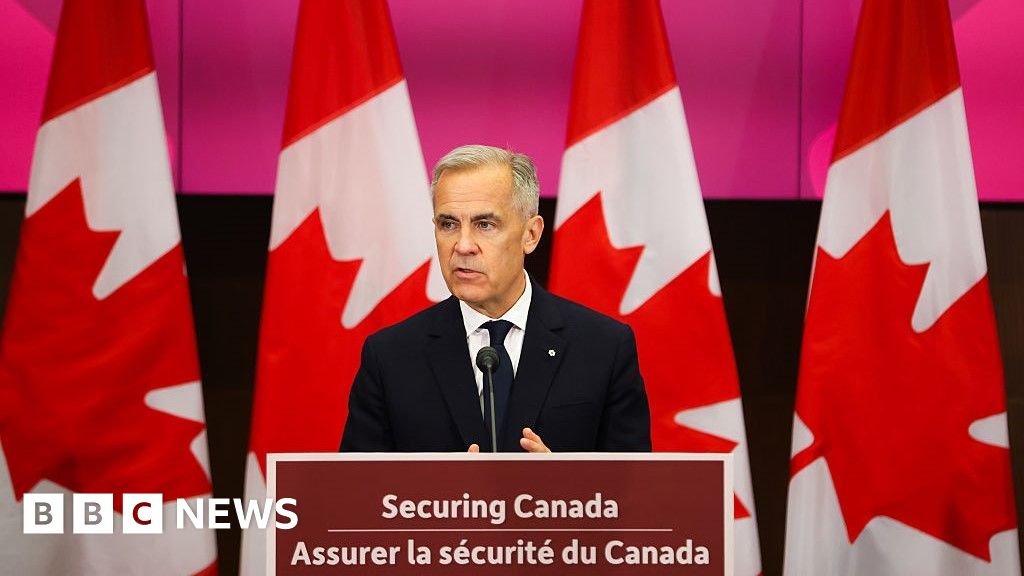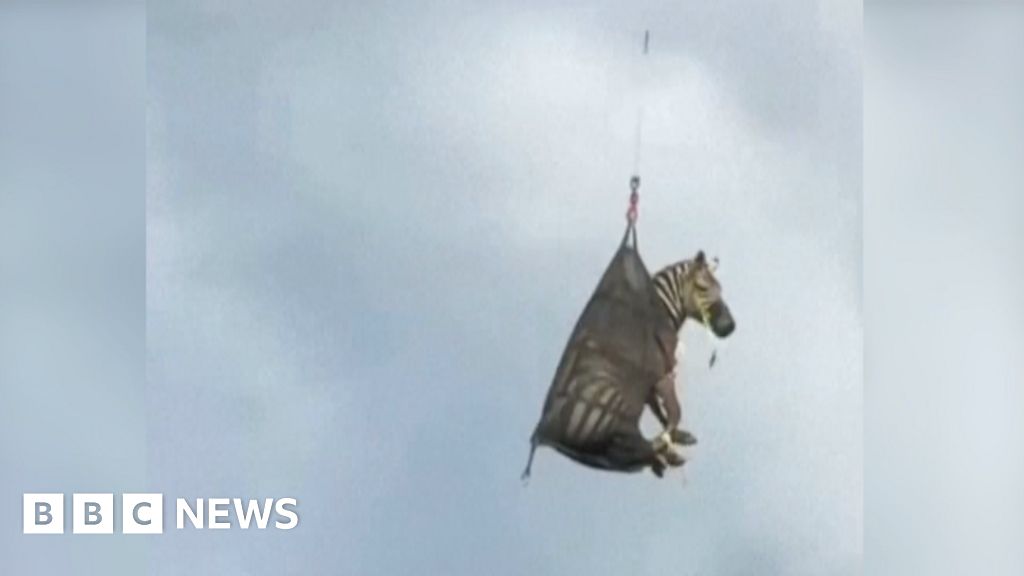ARTICLE AD BOX
 Image source, Getty Images
Image source, Getty Images
Mr Guo and Mr Bannon pictured together in 2018
By Mike Wendling & Grace Tsoi
BBC News
When Chinese tycoon and notable dissident Guo Wengui was charged with masterminding a $1bn fraud, it was only the latest chapter in the saga of a man with connections to powerful people in China, the US and the UK.
In early June 2020, at the tail end of the city's first Covid lockdown, a fleet of small planes baffled New Yorkers.
They circled overhead towing banners that read: "Congratulations to the New Federal State of China" and flew an unfamiliar-looking blue flag.
Was it a prank? A stunt? Weird propaganda?
The mystery was solved a few days later when Chinese billionaire Guo Wengui and former White House chief strategist Stephen Bannon appeared live online.
Together on a boat near the Statue of Liberty, with the same blue flag in the background, they awkwardly took turns speaking to the camera.
"We must eliminate Marxism-Leninism, the pariah and totalitarian regime of the Chinese Communist Party," Mr Guo declared.
It was the latest collaboration between the two men, who built large networks of online followers based on their shared obsessions: opposition to China's rulers, fealty to the Trump wing of the Republican Party, and conspiracy theories about Covid and vaccines.
Image source, Youtube
Image caption,A screenshot from the video featuring Mr Bannon and Mr Guo
The money trail
According to prosecutors, however, Mr Guo used his connections and online influence to defraud his supporters.
Thousands of Chinese dissidents - most living abroad - sent money, thinking they were buying shares in his businesses and cryptocurrency.
But instead of being invested, authorities say, the money was used by Mr Guo and a London-based business partner, Kin Ming Je, to fund extravagant purchases - including expensive properties, a yacht, sports cars, risky hedge fund investments, $1 million worth of rugs and a $140,000 piano.
The BBC spoke to several followers who say they gave thousands of dollars to Mr Guo's organisations.
"I watched his livestreams every day," said Coco, a Chinese immigrant who has been living in the US for a decade. We are not using her full name because she fears retribution from Mr Guo's followers.
"The videos are very sensational… and we trust[ed] him completely," she said.
Like many of his followers, Coco was drawn in by Mr Guo's opposition to the Chinese Communist Party, and his claims to have access to dirt on senior Chinese officials.
She became suspicious after investing in GTV, a media company founded by Mr Guo and Mr Bannon. She got invited to a WhatsApp group promising exclusive access to the tycoon, and joined protests outside the home of one of Mr Guo's opponents. She says the protesters were meant to get paid, but never did.
"We slowly discovered that he never fulfilled his promises," she said.
Image source, US Justice Department
Image caption,Prosecutors say that among other things, funds were used to buy this custom-built Bugatti sports car, worth approximately $4.4 million
Coco says she invested $6,000. One of her friends apparently gave more than $100,000 in order to become a "chair" - a member of Mr Guo's inner circle.
Prosecutors said victims were promised huge returns on their investments.
Despite the vast sums of money pumped into Mr Guo's companies and foundations, he declared bankruptcy last year, claiming less than $100,000 to his name.
Rags to riches
By all accounts, Mr Guo knows what it's like to be broke. Born in 1970, he grew up in poverty as one of eight children in China's north-eastern Shandong Province, according to a profile published in The New Yorker last year.
He spent time in prison, then embarked on a career in property development which made him one of China's richest people. By his own admission, he cultivated contacts in the country's intelligence services.
Mr Guo would later say that his wealth and connections gave him inside knowledge. But those same connections have led detractors to accuse him - including in a US court - of being a double agent working for the Chinese government.
Image source, Getty Images
Image caption,Pangu Plaza, a torch-shaped building in Beijing developed by Guo Wengui, pictured in 2017
In 2014, after a business dispute and the arrest of one of his intelligence contacts, Mr Guo fled China for London, then New York.
In both cities he fell in with important people. In 2015, he donated £2.1 million ($2.5 million) to a foundation run by Tony Blair. The former prime minister later wrote him a letter of recommendation as part of Mr Guo's application to buy the penthouse of an exclusive Manhattan apartment building - the same apartment that FBI agents raided this month.
Unlike other dissidents living abroad, Mr Guo was not content to keep a low profile. He became an outspoken critic of China's rulers, accusing several top officials of corruption.
The ill feeling was mutual. Chinese officials accused him of bribery, kidnapping, fraud, money laundering and rape, and sent a "red notice" seeking his arrest though Interpol.
In 2017, Mr Guo started a Twitter account and steadily built up a following on a number of social media platforms. He claimed political asylum in the United States, alleging persecution by Chinese authorities.
Later that year he met Mr Bannon, who had just been shunted out of his White House post. The pair found common ground, and started frequently appearing on each other's podcasts and online videos.
According to leaked documents, one Mr Guo's businesses paid Mr Bannon $1 million in consulting fees. They later co-founded GTV.
Image source, Getty Images
Image caption,Mr Guo owns the penthouse of this luxury apartment building in Manhattan
Kyle Weiss, a senior analyst at Graphika, a social media analytics company, authored a 2021 report on how Mr Guo's online presence blossomed into a movement, supported by a blitz of content on social media.
"When he began speaking out in 2017 and granted interviews to media outlets, he was quickly able to build a following by spilling the tea on the Chinese Communist Party," Weiss says. "That's certainly compelling and something you don't see a lot of."
That analysis was backed up by BBC interviews with Mr Guo's former supporters.
"He has won the hearts of many because he was calling on the end of the Chinese Communist Party," said Sarah, a Chinese immigrant, who did not want to use her full name. She lives in the US and says she gave around $50,000.
'Punishing the traitors'
The Bannon-inspired content production formula worked, and thousands of Mr Guo's fans took action, online and off.
At the extreme end, some of his followers rallied outside the homes of Mr Guo's enemies. Most of those enemies were themselves dissidents, who had somehow crossed the tycoon, prompting him to accuse them of being Chinese spies.
Although he has denied encouraging violence, Mr Guo launched what he called a "punishing the traitors" campaign.
Several of those targeted allegedly received death threats. At least one was beaten by Mr Guo's followers.
Teng Biao, a dissident who fled China and is a visiting professor at the University of Chicago, was one of the people targeted in the "traitors" campaign. He said that he began writing about Mr Guo in 2017, believing that the businessman was discrediting the work of Chinese dissidents.
Mr Guo sued Mr Teng for defamation, but the case was dismissed.
That did not stop the attacks.
For two months starting in late 2021, up to 30 activists rallied every day outside of his house in New Jersey, Mr Teng told the BBC.
"They were standing in front of my house and holding banners and signs calling me a [Chinese Communist Party] spy and they kept filming my house, livestreaming, and cursing me and my children and my family," Mr Teng said. "His followers sent me death threats."
Coco, the investor who has since turned against Mr Guo, said she participated in a rally outside the house of another Chinese dissident, Bob Fu.
Fu is a pastor and religious freedom activist who left China in the 1990s. Mr Guo accused him of being a Chinese spy.
"I regret joining these actions very much," Coco said. "Those people are not Chinese Communist Party spies as Guo said."
Another former follower who worked for Mr Guo as a volunteer translator, but did not want to be named for fear of retribution, told the BBC that his companies collected personal information on followers who gave money, claiming they were "know your customer" checks like those regularly used by banks.
"He has all their personal information, passport, identity cards, address, email, phone numbers, you name it," she said.
The result, she alleged, is that many followers - especially those still living in China - are afraid of speaking out because they worry this information will be leaked.
Fraud allegations
But Mr Guo's network came crashing down last week when US authorities charged him with orchestrating a billion-dollar fraud.
According to the indictment, 5,500 investors sunk a total of $452 million into GTV, which Mr Guo claimed was worth $2 billion. In reality, it is alleged, it was a new business and had no revenue.
Image source, US Justice Department
Image caption,Authorities say that money was spent on luxury goods and services, including $2.3 million on maintenance of this luxury yacht
Possible signs that things were unravelling date back all the way to August 2020, when Mr Bannon was arrested aboard a yacht owned by Mr Guo, accused of defrauding donors to a not-for-profit company which aimed to build a wall on the US-Mexico border. He pleaded not guilty.
As Mr Guo and Mr Bannon were cementing their partnership in the New Federal State project, US authorities had begun investigating their business activities.
It led to Mr Guo's companies facing allegations of misleading investors, forcing him to pay $539 million to settle a lawsuit by the Securities and Exchange Commission (SEC), the US financial regulator.
The SEC alleged that Mr Guo illegally sold cryptocurrency and stock in GTV to investors.
It was not the end of his legal and financial troubles, however, and culminated in the arrest last week for wire fraud, securities fraud, bank fraud and money laundering.
In a statement issued through Mr Guo's foundations, his representatives called the allegations against him "fabricated and unwarranted" and accused the US justice system of being controlled by the Chinese Communist Party, without providing evidence. They did not respond to further questions and declined an interview request.
A lawyer for Mr Je - Mr Guo's business partner - says he vehemently denies the allegations.
Mr Bannon was not named in the indictment, and did not respond to messages seeking comment.
In the days after the FBI raid, he covered a range of topics on his podcasts - including Covid, the 2020 election, and China.
But Mr Guo's arrest was not one of them.

 2 years ago
41
2 years ago
41








 English (US) ·
English (US) ·